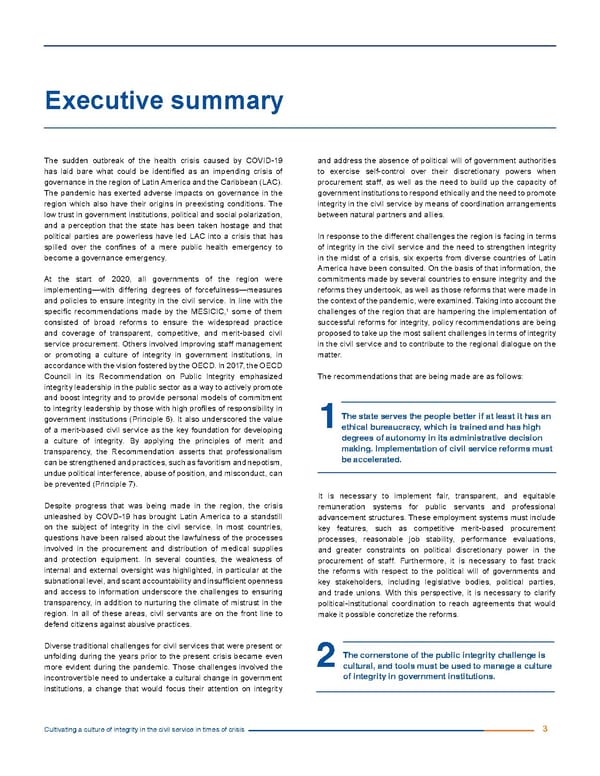Executive summary The sudden outbreak of the health crisis caused by COVID-19 and address the absence of political will of government authorities has laid bare what could be identified as an impending crisis of to exercise self-control over their discretionary powers when governance in the region of Latin America and the Caribbean (LAC). procurement staff, as well as the need to build up the capacity of The pandemic has exerted adverse impacts on governance in the government institutions to respond ethically and the need to promote region which also have their origins in preexisting conditions. The integrity in the civil service by means of coordination arrangements low trust in government institutions, political and social polarization, between natural partners and allies. and a perception that the state has been taken hostage and that political parties are powerless have led LAC into a crisis that has In response to the different challenges the region is facing in terms spilled over the confines of a mere public health emergency to of integrity in the civil service and the need to strengthen integrity become a governance emergency. in the midst of a crisis, six experts from diverse countries of Latin America have been consulted. On the basis of that information, the At the start of 2020, all governments of the region were commitments made by several countries to ensure integrity and the implementing—with differing degrees of forcefulness—measures reforms they undertook, as well as those reforms that were made in and policies to ensure integrity in the civil service. In line with the the context of the pandemic, were examined. Taking into account the 1 specific recommendations made by the MESICIC, some of them challenges of the region that are hampering the implementation of consisted of broad reforms to ensure the widespread practice successful reforms for integrity, policy recommendations are being and coverage of transparent, competitive, and merit-based civil proposed to take up the most salient challenges in terms of integrity service procurement. Others involved improving staff management in the civil service and to contribute to the regional dialogue on the or promoting a culture of integrity in government institutions, in matter. accordance with the vision fostered by the OECD. In 2017, the OECD Council in its Recommendation on Public Integrity emphasized The recommendations that are being made are as follows: integrity leadership in the public sector as a way to actively promote and boost integrity and to provide personal models of commitment to integrity leadership by those with high profiles of responsibility in government institutions (Principle 6). It also underscored the value The state serves the people better if at least it has an 1 of a merit-based civil service as the key foundation for developing ethical bureaucracy, which is trained and has high a culture of integrity. By applying the principles of merit and degrees of autonomy in its administrative decision transparency, the Recommendation asserts that professionalism making. Implementation of civil service reforms must can be strengthened and practices, such as favoritism and nepotism, be accelerated. undue political interference, abuse of position, and misconduct, can be prevented (Principle 7). It is necessary to implement fair, transparent, and equitable Despite progress that was being made in the region, the crisis remuneration systems for public servants and professional unleashed by COVD-19 has brought Latin America to a standstill advancement structures. These employment systems must include on the subject of integrity in the civil service. In most countries, key features, such as competitive merit-based procurement questions have been raised about the lawfulness of the processes processes, reasonable job stability, performance evaluations, involved in the procurement and distribution of medical supplies and greater constraints on political discretionary power in the and protection equipment. In several counties, the weakness of procurement of staff. Furthermore, it is necessary to fast track internal and external oversight was highlighted, in particular at the the reforms with respect to the political will of governments and subnational level, and scant accountability and insufficient openness key stakeholders, including legislative bodies, political parties, and access to information underscore the challenges to ensuring and trade unions. With this perspective, it is necessary to clarify transparency, in addition to nurturing the climate of mistrust in the political-institutional coordination to reach agreements that would region. In all of these areas, civil servants are on the front line to make it possible concretize the reforms. defend citizens against abusive practices. Diverse traditional challenges for civil services that were present or unfolding during the years prior to the present crisis became even The cornerstone of the public integrity challenge is 2 more evident during the pandemic. Those challenges involved the cultural, and tools must be used to manage a culture incontrovertible need to undertake a cultural change in government of integrity in government institutions. institutions, a change that would focus their attention on integrity Cultivating a culture of integrity in the civil service in times of crisis 3
 Cultivating a culture of integrity in the civil service in times of crisis. Page 10 Page 12
Cultivating a culture of integrity in the civil service in times of crisis. Page 10 Page 12